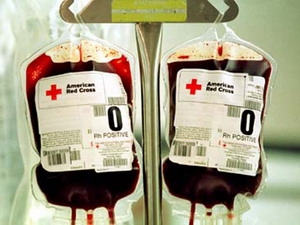Breakthrough in the production of large-scale artificial blood
For the first time in the UK, scientists have successfully developed red blood cells from embryos of artificial implants, a promising breakthrough that can produce artificial blood on a large scale.

Illustration.Source: Internet
Scientists used more than 100 samples of embryos taken from maternity hospitals, divided into different lines to synthesize red blood cells. One of these lines, called RC-7, has resulted in the conversion of embryonic stem cells into blood cells and continues to turn into red blood cells containing hemoglobin - the pigment blood that carries oxygen in the blood.
From these red blood cells, scientists will develop into blood type O, a blood group that can be transmitted to all patients without rejection, but very rarely, because only about 7% World Population.
Experts say an artificial blood production project could promise a revolution for the health sector, because it provides a stable supply of blood, ending its dependence on voluntary donations of blood.
Artificial blood also ensures 'cleanness' - that is, not affected by the types of donor pathogens.
One of the main requirements of artificial blood is that it must be cheaper than donated blood. According to calculations, one liter of donated blood, if including test costs and other costs, can take up to 1,000 pounds to be able to pass on to patients.
If successful, the project could produce more than 1 million liters of blood per year. However, artificial blood samples must also be approved by competent authorities before being tested in humans.
This process is expected to take about five years.
- A way to produce artificial blood has been found on an industrial scale
- New breakthrough in artificial blood production
- Artificial blood will be tested in humans in 2016
- Study artificial blood test
- Artificial blood can save patients' lives like real blood
- Artificial blood - human hope
- Japanese scientists successfully tested artificial blood on rabbits
- Processing artificial blood from ... deep sea
- There was artificial blood
- Successfully developing blood from human skin, opening a new era for medicine
- Artificial blood from sugar beet
- Production of fish spotted by artificial method
 'Barefoot engineer' invents a pipeless pump
'Barefoot engineer' invents a pipeless pump Process of handling dead pigs due to disease
Process of handling dead pigs due to disease Radiometer
Radiometer Warp Engine: Technology brings us closer to the speed of light
Warp Engine: Technology brings us closer to the speed of light Pig's blood helps to stay young, lose weight, and prevent cancer, but is 'a big no-no' for the following people
Pig's blood helps to stay young, lose weight, and prevent cancer, but is 'a big no-no' for the following people  How does the kidney filter blood?
How does the kidney filter blood?  American millionaire uses 17-year-old son's blood to rejuvenate
American millionaire uses 17-year-old son's blood to rejuvenate  Why does nature produce so many blood-sucking insects?
Why does nature produce so many blood-sucking insects?  Superpower gene discovered, 'superhumans' will soon become a reality in the future!
Superpower gene discovered, 'superhumans' will soon become a reality in the future!  New discovery about people who may be naturally resistant to nCoV
New discovery about people who may be naturally resistant to nCoV 